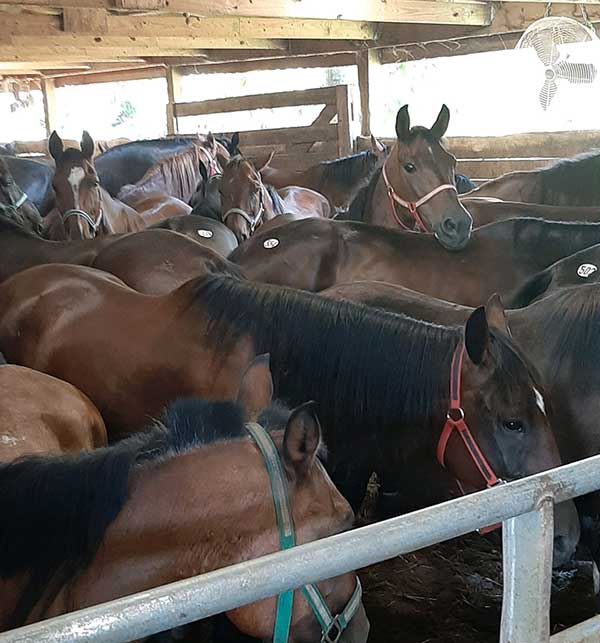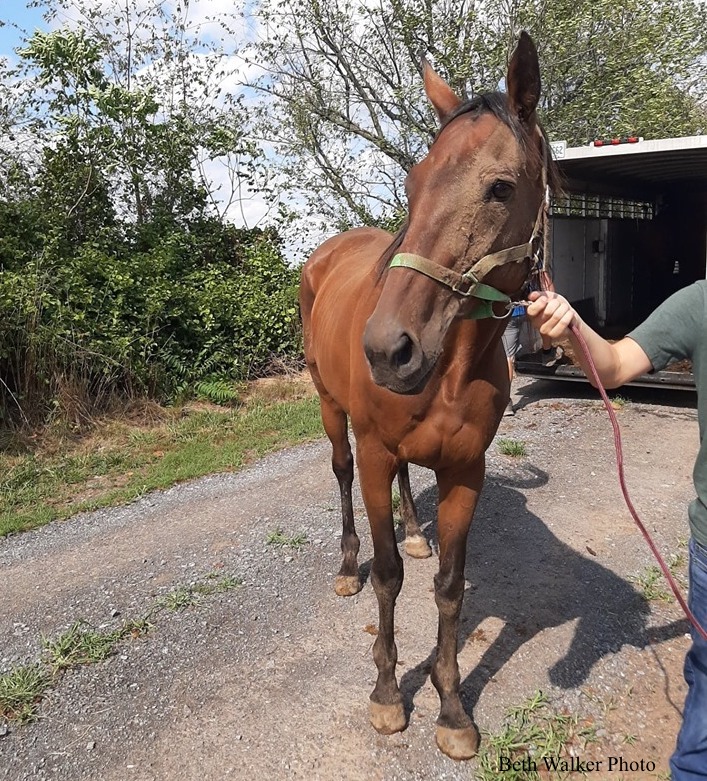
In times of economic strife, it's not hard to find them – ads on Craigslist or posts on Facebook (despite its ban on the sale of animals) advertising horses “free to a good home.” Sometimes they're just “free.” Of course, for every horse that isn't publicly advertised in search of a new placement, there are those who are given away or sold for low prices to acquaintances of acquaintances.
For one small breeder in Central Kentucky who asked to remain anonymous, it was something of a relief when a longtime friend offered to take 23-year-old pensioned broodmare Procession. The mare was on the farm, having been retired from breeding a couple of seasons before. The friend was in a pinch, having lost a mare she had needed to fill out a stallion season. It turned out Procession was no longer fertile, so she continued living the retired life with slightly different scenery.
One day, local horseman Tommy Browning came to Procession's new home to collect one of his nurse mares, who he had leased out as an artificially-induced lactating mare (meaning there was no foal produced to stimulate milk flow). Browning took an interest in Procession. He was looking for more mares to help him meet the demand for foal-free nurse mares for next season, he said. Both breeders had had nurse mares from Browning before, and those mares seemed to arrive in good physical condition, so neither had serious concerns about giving him Procession.
Browning also picked up 20-year-old mare Tack Room as a freebie from another farm after telling her owner the same story.
Browning has been charged with animal cruelty twice in the state of Kentucky, though both times charges were dropped. One charge stemmed from an incident in January 2019 in which Browning's trailer broke down along I-75 and Browning allegedly left a mare tied inside with no food or water from mid-afternoon until the next icy-cold morning when a policeman was called to check on the trailer.
In 2014, concerned neighbors took to social media to accuse Browning of starving mares kept on a dry lot in the middle of spring. Browning told the Georgetown News-Graphic he was keeping the mares off grass to avoid exposing them to tall fescue, which can be infected with a fungus that can be harmful to lactating mares. Browning said he fed the mares hay and had every financial incentive to keep them in the best of health.
In 2011, Browning pleaded guilty on six misdemeanor charges of failing to dispose of equine carcasses on his property in Stamping Ground, Ky.

One month after Procession left her owner's farm, she and Tack Room would be discovered in a pen owned by a Pennsylvania-based contractor for a Canadian horse slaughter facility. They were part of a group of seven Thoroughbred mares who all arrived at about the same time.
“I didn't feel spooked by the guy,” Procession's owner said. “In a year when I could just as easily have to give away all my sales yearlings, I was happy to get her off the payroll. I just didn't feel scared about it – until I got a call. 'Your mare is in a kill pen.' And I was shocked.
“I know that what I thought doesn't matter. What matters is what happened to my mare, and that is tragic. If I could put a stop to it without stepping away from my day to day job, I would. If I could take it all back, I would. I wish I never gave her away, I wish I'd said, 'No I'm not sure they'll take care of her.' But in my world, why wouldn't someone take care of a mare?”
Browning did not return a voice message seeking comment on what happened to Procession and Tack Room.
One of the other mares in the pen was Canora, a 20-year-old daughter of Runaway Groom. Until July 23, Canora was on Final Furlong Farm in Sparta, Tenn., with a 2020 filly by her side. Earlier this year, Final Furlong owner Lee Blaisdell made the difficult decision to reduce her stock of horses and goats due to nagging physical problems. She got ahold of Josh Key, a local horseman who had purchased horses from her before. Key agreed to buy the mare for $200 in hopes she could be a children's riding horse, and Blaisdell told him to bring her back if there were any problems.
Blaisdell didn't know that Key didn't still have the mare until she was contacted for this story.
“I'm devastated. She was to come back here if it didn't work out,” said Blaisdell. “I owe Canora nothing less than the best I can provide. Never, ever will a horse I've owned or bred see a kill pen.“
Key said he works as a horse trader but is adamant he does not deal with slaughter buyers. He makes his living buying and selling horses, sometimes privately and sometimes at public auction. In the case of an auction, he said, he has no control over who purchases the horse or what they do with it afterward, but that's the trade-off in selling an animal. In Canora's case, Key said she was sold privately and he didn't know she had left her new home.
“I sold her to a family and I don't know what they did with her, it ain't any of my business,” said Key. “I buy horses and try to match them with riders. If they didn't want that mare sold, they shouldn't have sold her in the first place.
“People think that because we trade horses I'm a killer buyer. I don't want that [expletive] at my house.”
Key said that because he is well known to be a trader, he has known of people who refuse to sell him horses – and then list them online for cheap with a handful of poor photos showing a muddy horse standing in a field. If anything, he thinks that kind of ad is more likely to attract a kill buyer than he is.
“People need to know that when they put her on the internet for $250, they welcomed problems right then,” he said. “If they don't want their horses going to slaughter, they need to know something about them, they need to price them higher, put better saddles on them, advertise them right. We spend hours taking pictures of horses to put them on the internet. The way you advertise the horse means a lot, it means where he's going to go.”
Key also said Canora had been listed for $250 online when he messaged Blaisdell expressing interest, and he had made a profit when he sold her to what he thought was a riding home.
“I got what I thought was over kill price for her, if you go by the weight of her,” he said. “I got way more than what [the sellers] asked for. I don't know what happened there after I sold her, but [the buyers] were not a kill buyer, to my knowledge, and I pretty much know 'em all.”
Key said “there's no blue book” for selling horses to slaughter facilities, and the amount he's seen kill buyers pay depends on how much competition they get at an auction, but it ranges from $.20 to $.50 or $.60 per pound.
“Y'all need to stop the damn backyard breeders,” said Key. “All the backyard breeders are doing is supplying kill buyers. I'm emotional about it, because I think people who trade horses like me get a bad rap for that [expletive], and we're not all like that.”

When rescuers got to Canora in the kill pen, it was the first week of August and she'd already been there seven to 10 days. The route Canora, Procession, and the other mares in the pen took to get there remains unclear after their stops with Browning and Key – both to their last long-term owners and to the rescues that worked to pull them out. What is clear is that those transitions from home to pen happened quickly.
For Marlene Murray, president of R.A.C.E. Fund, the shock and disappointment expressed by the mares' former owners is nothing new. As the co-founder of the Thoroughbred Aftercare Alliance-accredited organization, she frequently raises cash and organizes medical care and homes for horses in kill pens. In the case of these mares, Murray said they were not in a social media “bail lot” but a holding facility of a kill buyer who allows limited access to rescues and individuals who are then required to pay his last-chance price. Murray said the pen ships weekly and does not offer reprieves, even for horses in the middle of a fundraising effort.
“It is so expensive,” said Murray just after the rescue. “Last week I was about ready to pull my hair out. We actually got 10 horses out within two weeks' time, and that is a major, major undertaking and it's very expensive. A lot of people have to be involved to get funds, try to find places for them to go, trying to find quarantine. And we didn't put these horses in this situation.
“The killer buyer never tells us where he gets them. These buyers go to auctions, they buy horses privately. They probably even have horses given to them, I don't know. Once in a blue moon we'll find out that a horse has gone through a specific auction – New Holland or wherever – and then they end up here.”
A variety of organizations stepped up to fundraise and house the group of seven that included Procession, Tack Room, and Canora, including Thoroughbred Retirement Foundation, Lifehorse, LongRun, Galloping Out, Beyond the Roses, the Foxy G Fund, Impact Equine, and Leilani Mae Horse Rescue. The mares are in quarantine now and have homes waiting for them when they are well enough to travel.
Murray said that in addition to their sale price, quarantines, and a home for the rest of their lives, the mares also need medical care. They stood for seven to 10 days in a pen with no shelter in the midst of an especially hot summer. All were dehydrated by the time Murray got to them, and most had bites, scrapes, and bruises, presumably from herd confrontations. One mare had a bad hematoma on her chest and another had an abscess. A couple of them were in poor weight. Canora was still dripping milk for the filly weaned just before her sale. It's also unknown how many of them had health problems before they were given away or sold, as crowded pens and stressful situations can result in rapid weight loss and injuries for older horses.
As Murray struggled to raise money for the mares, she knows the kill contractor lined his wallet.
“The kill buyers, they make a profit,” she said. “Of course they do. They're not going to just give them to you. And the prices are getting higher. Some of them are extremely greedy. Some are not as bad as others. You're going to pay over what they paid for the horse.”
For Murray, it's hard to imagine there are still horse owners unaware of the slaughter pipeline or the risks of giving a horse away. Many people still sell or give horses away with no written contract cementing their desire to be given first right of refusal in the event the new owner wants to get rid of the horse. Even such a clause in a contract is unlikely to result in an owner actually reclaiming a horse that has passed into different hands; on a practical level, it becomes enforceable after a purchaser has violated the clause and the clause allows the owner to take them to court, not necessarily to reclaim the animal.
Over the years, Murray has grown frustrated by owners who, knowingly or unknowingly, put horses into the pipeline. She wonders how many of them get duped into giving their horses up, how many fail to do adequate research on the person they give the horse to, and how many just don't want to know where they're really going.
“This is what happens a lot of times — people in the industry, breeders, everybody needs to get it through their head: you can't just give a horse away to anybody,” she said. “Where do they think a 20-year-old mare is going to go? Did you have any paperwork? Did you check them out? Did you follow up? People need to start being more responsible and be more accountable.
“People need to truly understand what these horses go through when they experience what these mares went through, and others before them, and others that will end up like this after them.”
Procession's owner said she can understand that frustration. She's frustrated with herself for not knowing better, and not doing better. She said she's not on social media, had never heard about Browning's criminal history, and didn't know the slaughter pipeline existed before now, at least not in its modern form. She also knows her regret doesn't do anything to help the horse.
“The bottom line is the mare,” she said. “It doesn't matter how guilty I feel, or how much I didn't mean for this to happen. It's tragic. She was a giver. She wasn't hurting anybody and she never asked to be abused.
“Of course the other side of it is, how do people who can't afford it get rid of horses? Even if you shoot the horse, it costs $175 to have it hauled away. Some people don't have that. I'm not justifying another end, but I'm just saying that's the reality for many people. It's a tragedy, but I understand how it happens.”
Now, she hopes Procession's story and that of the other mares in that pen can serve as a warning.
“Don't give your mares away, or any horse away, no matter how innocent it seems.”
This article originally appeared on The Paulick Report and is published here with permission.
There are more articles in our section on Retire & Rehome.













